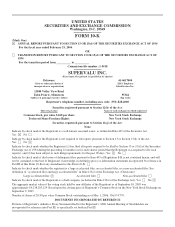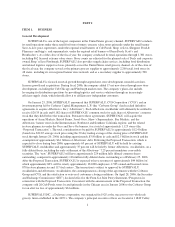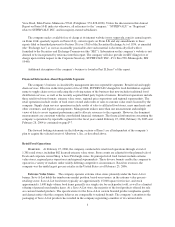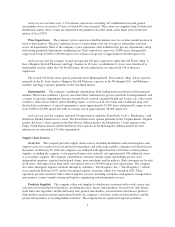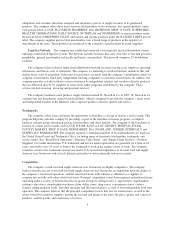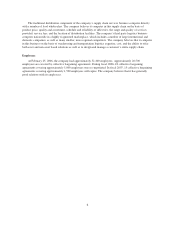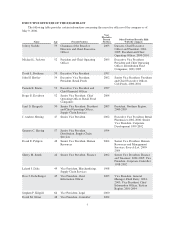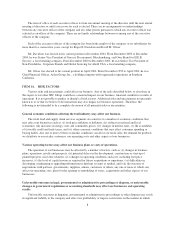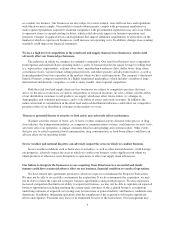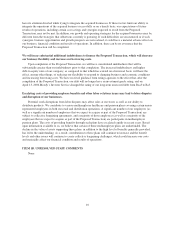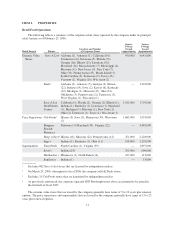Albertsons 2006 Annual Report Download - page 5
Download and view the complete annual report
Please find page 5 of the 2006 Albertsons annual report below. You can navigate through the pages in the report by either clicking on the pages listed below, or by using the keyword search tool below to find specific information within the annual report.obligations and considers that it has adequate and alternative sources of supply for most of its purchased
products. The company offers three tiers of private label products to its customers: first quality products under
such private labels as CUB, FLAVORITE, HOMEBEST, IGA, RICHFOOD, SHOP ‘N SAVE, SUPERCHILL,
HEALTHY GENERATIONS, DAILY SOURCE, NUTRIPLAN and STONERIDGE; economy products under
the private label of SHOPPERS VALUE; and natural and organic products under the NATURE’S BEST private
label. The company supplies private label merchandise over a broad range of products in the majority of
departments in the store. These products are produced to the company’s specifications by many suppliers.
Logistics Network. The company has established a network of strategically located distribution centers
utilizing a multi-tiered logistics system. The network includes facilities that carry slow turn or fast turn groceries,
perishables, general merchandise and health and beauty care products. The network comprises 25 distribution
facilities.
The company believes that its multi-tiered distribution network increases buying scale, improves operating
efficiencies and lowers costs of operations. The company is continuing to work on business initiatives that will
deliver lower costs of operations. Deliveries to retail stores are made from the company’s distribution centers by
company-owned trucks, third party independent trucking companies or customer-owned trucks. In addition, the
company provides certain facilitative services between its independent retailers and vendors related to products
that are delivered directly by suppliers to retail stores under programs established by the company. These
services include sourcing, invoicing and payment services.
The company launched a new produce supply business named W. Newell & Co. in 2005. W. Newell & Co.
currently has one distribution center located in Illinois, which is designed to provide the company’s retail stores
and independent retailers in the Midwest with a superior produce selection, quality and service.
Trademarks
The company offers some customers the opportunity to franchise a concept or license a service mark. This
program helps the customer compete by providing, as part of the franchise or license program, a complete
business concept, group advertising, private label products and other benefits. The company is the franchisor or
licensor of certain service marks such as CUB FOODS, SAVE-A-LOT, SENTRY, FESTIVAL FOODS,
COUNTY MARKET, SHOP ‘N SAVE, NEWMARKET, IGA, FOODLAND, JUBILEE, SUPERVALU and
SUPERVALU PHARMACIES. The company registers a substantial number of its trademarks/service marks in
the United States Patent and Trademark Office, including many of its private label product trademarks and
service marks. See “Retail Food Operations—Extreme Value Stores” and “Supply Chain Services—Products
Supplied” for further information. U.S. trademark and service mark registrations are generally for a term of 10
years, renewable every 10 years as long as the trademark is used in the regular course of trade. The company
considers certain of its trademarks and service marks to be of material importance to its retail food and supply
chain services businesses and actively defends and enforces such trademarks and service marks.
Competition
The company’s retail food and supply chain services businesses are highly competitive. The company
believes that the success of its retail food and supply chain services businesses are dependent upon the ability of
the company’s retail food operations, and the retail food stores with whom it is affiliated as a supplier, to
compete successfully with other retail food stores. Principal competition comes from regional and national chains
operating under a variety of formats that devote square footage to selling food (i.e. supercenters, supermarkets,
extreme value stores, membership warehouse clubs, dollar stores, drug stores, convenience stores, various
formats selling prepared foods, and other specialty and discount retailers), as well as from independent food store
operators. The company believes that the principal competitive factors that face its owned stores, as well as the
stores owned by retailers it supplies, include the location and image of the store; the price, quality and variety of
products; and the quality and consistency of service.
5

